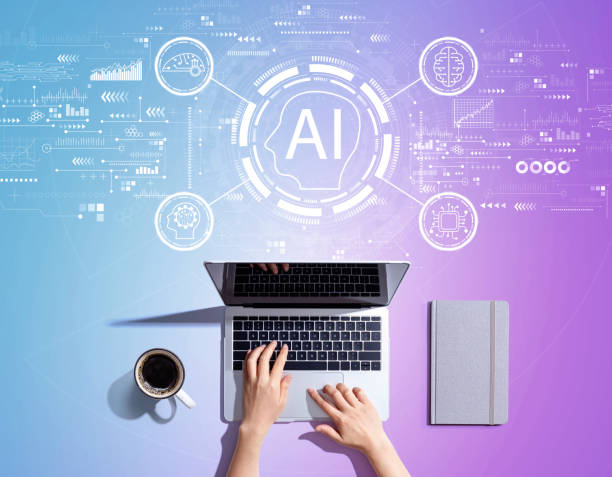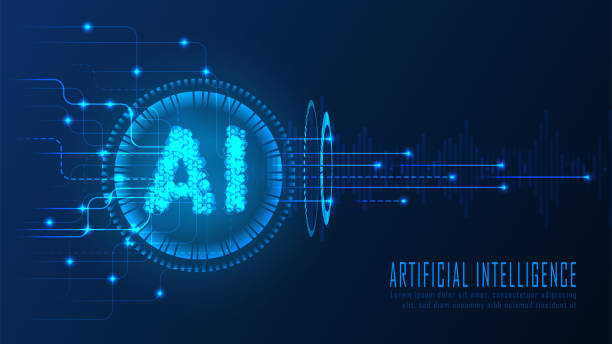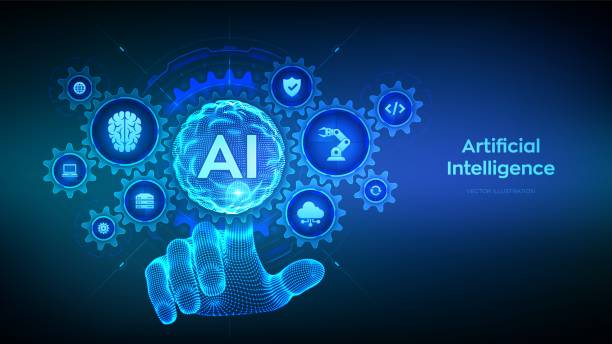AI on Mobile: A Quick Look

AI on Mobile: A Quick Look
#Artificial_Intelligence (AI) is rapidly infiltrating various aspects of our lives, and mobile phones, as one of the primary tools for communication and information, are no exception.
Mobile AI applications are no longer a distant concept; rather, they have become a practical tool that can help us with daily tasks, enhance our creativity, and even make better decisions.
From smart voice assistants like Siri and Google Assistant to photo and video editing applications that automatically improve images, AI is increasingly present in our mobile devices.
This article takes a closer look at mobile AI applications, their applications, advantages, and disadvantages.
Mobile AI applications use complex algorithms to analyze data and identify patterns that allow the device to perform various tasks.
These tasks can include facial recognition in images, automatic language translation, music suggestions based on user preferences, and even detecting anomalies in medical data.
The importance of mobile AI applications lies in the fact that they allow us to benefit from the computational and analytical power of AI anytime, anywhere.
In this article, we will examine the different types of mobile AI applications, how they work, as well as tips for choosing the best application to suit your needs.
We will also address the challenges and concerns related to the use of AI in mobile phones, such as issues related to privacy and data security.
Do you dream of a thriving online store but don’t know where to start?
Rasaweb is your comprehensive e-commerce website design solution.
✅ Attractive and user-friendly design
✅ Increased sales and revenue⚡ Get free consultation
Types of Mobile AI Applications and Their Uses

Types of Mobile AI Applications and Their Uses
Mobile AI applications fall into different categories, each with its own specific uses.
Some of these categories include:
- Voice Assistants Mobile AI applications such as Google Assistant and Siri allow users to interact with their devices using voice commands.
These assistants can make calls, send messages, play music, search for information, and perform many other tasks. - Photo and Video Editing Applications These applications use AI to improve image quality, remove unwanted objects, and apply creative filters.
Some of these applications can even automatically retouch images and beautify faces. - Language Translation Applications Mobile AI applications These applications use AI to automatically translate texts and sounds.
These tools are very useful for travelers, language students, and people who communicate with foreigners. - Health and Treatment Applications These applications use AI to diagnose diseases, provide medical advice, and track the health status of patients.
Some of these applications can even diagnose disease symptoms based on information entered by the user. - Educational Applications Mobile AI applications These applications use AI to provide personalized training and adapt educational content to the needs of each student.
These tools can help students improve in various academic fields.
In addition to these categories, mobile AI applications have extensive applications in other fields such as e-commerce, video games, and cybersecurity.
For example, in e-commerce, AI can be used to suggest products to customers based on their taste and purchase history.
In video games, AI can be used to create non-player characters (NPCs) with natural and intelligent behavior.
And in cybersecurity, AI can be used to detect and prevent cyberattacks.
Advantages of Using Mobile AI Applications

Advantages of Using Mobile AI Applications
Using mobile AI applications has many advantages, including:
- Increased Productivity Mobile AI applications can help you do things faster and more efficiently.
For example, a voice assistant can help you set reminders, send emails, and search for information without having to type. - Improved Accuracy AI can help reduce errors and improve accuracy in performing various tasks.
For example, a facial recognition application can help you identify people in images with high accuracy. - Personalized User Experience Mobile AI applications can personalize the user experience according to the needs and preferences of each user.
For example, a music application can suggest songs that you are likely to enjoy. - Easy Access to Information AI can help you access information easier and faster.
For example, a language translation application can help you understand texts in foreign languages. - Better Decision Making Mobile AI applications can help you make better decisions by analyzing data and providing new insights.
For example, a financial application can help you manage your investments.
| Advantage | Explanation |
|---|---|
| Increased Productivity | Doing things faster and more efficiently |
| Improved Accuracy | Reducing errors and increasing accuracy |
| Personalized Experience | Matching user needs and preferences |
| Easy Access to Information | Faster access to data |
| Better Decision Making | Data analysis for decision making |
Challenges and Disadvantages of Mobile AI Applications

Challenges and Disadvantages of Mobile AI Applications
Despite the many advantages, using mobile AI applications also has challenges and disadvantages, including:
- Privacy Concerns Mobile AI applications often have access to users’ personal data, which can lead to privacy concerns.
For example, a facial recognition application may store your images without your knowledge. - Security Issues Mobile AI applications may be vulnerable to cyberattacks, which can lead to the theft of users’ personal information.
For example, a hacker can steal your credit card information by accessing a mobile payment application. - Internet Dependency Many mobile AI applications require the Internet to function properly, which can be problematic in areas with limited Internet access.
- High Battery Consumption Mobile AI applications can significantly increase the battery consumption of the device, especially if they use complex algorithms.
- AI Mistakes and Errors AI is not yet perfect and may make mistakes in performing various tasks.
For example, a language translation application may provide incorrect translations.
To reduce these challenges, users should use mobile AI applications consciously and pay attention to their privacy and security settings.
Also, developers should pay special attention to issues related to privacy, security, and battery consumption when designing and developing AI applications.
Using mobile AI applications, while it can be very useful, requires caution and awareness.
Tired of losing customers due to poor e-commerce website design? With Rasaweb, solve this problem forever!
✅ Increase sales and visitor-to-customer conversion rate
✅ Smooth and attractive user experience for your customers⚡ Get free consultation
Introducing the Best Mobile AI Applications in Different Categories

Introducing the Best Mobile AI Applications in Different Categories
Given the high variety of mobile AI applications, choosing the best application can be difficult.
In this section, we introduce some of the best applications in different categories:
- Voice Assistants Google Assistant, Siri, Amazon Alexa
- Photo and Video Editing Applications Adobe Photoshop Camera, Prisma, PicsArt
- Language Translation Applications Google Translate, Microsoft Translator, iTranslate
- Health and Treatment Applications Ada, Babylon Health, MyFitnessPal
- Educational Applications Duolingo, Khan Academy, Coursera
These applications are just examples of the thousands of mobile AI applications available on the market.
To choose the best application for yourself, you must consider your needs and preferences and also read the opinions of other users.
For example, if you are looking for a voice assistant, Google Assistant is a good option due to its extensive capabilities and integration with other Google services.
If you are looking for a photo and video editing application, Adobe Photoshop Camera with its various filters and powerful tools, can be a good option.
And if you are looking for a language translation application, Google Translate with support for over 100 languages and the ability to translate texts, sounds, and images, is one of the best options.
In general, the best mobile AI application for you is an application that best meets your needs and is easy and enjoyable to use.
Therefore, before choosing an application, be sure to try it out and make sure you are comfortable with it.
Tips for Choosing the Right Mobile AI Application

Tips for Choosing the Right Mobile AI Application
To choose the right mobile AI application, consider the following:
- Identify Your Needs Before anything else, you need to specify what you expect from an AI application and what needs you want to meet.
For example, are you looking for an application for photo editing, language translation, or help with daily tasks? - Read User Reviews Other users’ opinions can help you better understand the performance and quality of an application.
Before downloading an application, be sure to read user reviews in application stores. - Pay Attention to Privacy and Security Settings Make sure that the application you choose protects your privacy and protects your data.
Pay attention to the privacy and security settings of the application and adjust them according to your needs. - Consider Battery Consumption Some mobile AI applications can significantly increase the device’s battery consumption.
Before installing an application, make sure that its battery consumption is reasonable. - Try the Application Try the application for free before buying or subscribing to it.
This helps you make sure that the application is compatible with your needs and that you enjoy it.
By following these tips, you can choose the right mobile AI application for yourself and benefit from its advantages.
Remember that the best application for you is an application that best meets your needs and is easy and enjoyable to use.
Choosing a mobile AI application wisely can help you with daily tasks, learn new skills, and improve your quality of life.
The Future of Mobile AI Applications

The Future of Mobile AI Applications
The future of mobile AI applications looks very bright and exciting.
With the advancement of technology and the increase in the processing power of mobile phones, it is expected that more complex and powerful AI applications will be available.
Some of the key trends we will see in the future of mobile AI applications include:
- Increased Use of Deep Learning Deep learning is a branch of AI that allows machines to learn from large amounts of data and identify complex patterns.
The use of deep learning in mobile AI applications can lead to improved accuracy and efficiency of these applications. - Expansion of AI Applications Mobile AI applications are expected to be used in more fields, including health and treatment, education, transportation, and entertainment.
- More Personalization In the future, mobile AI applications will be able to fully personalize the user experience according to the needs and preferences of each user.
- Increased Focus on Privacy and Security With increasing concerns about privacy and data security, mobile AI application developers are expected to pay more attention to these issues and provide new solutions to protect users’ data.
- Integration with Other Technologies Mobile AI applications will be increasingly integrated with other technologies such as the Internet of Things (IoT), Augmented Reality (AR), and Virtual Reality (VR) in the future.
In general, the future of mobile AI applications is full of new and exciting opportunities.
With the advancement of technology and increasing user awareness, these applications are expected to become an essential tool in our daily lives.
By providing smart and efficient solutions, mobile AI applications can help us with daily tasks, learn new skills, and improve our quality of life.
Privacy and Security in Mobile AI Applications

Privacy and Security in Mobile AI Applications
As mentioned earlier, privacy and security are among the most important challenges related to the use of mobile AI applications.
These applications often have access to users’ personal data, which can lead to serious concerns.
To protect your privacy and security when using mobile AI applications, consider the following:
- Only Download Trusted Applications Before downloading an application, make sure it is downloaded from a trusted source and is built by a trusted developer.
- Pay Attention to Application Access Permissions Before installing an application, pay attention to its access permissions and make sure that the application only has access to data that is necessary for its operation.
- Check Privacy Settings Many applications allow you to adjust your privacy settings and limit the application’s access to your data.
Check these settings and adjust them according to your needs. - Choose Strong Passwords Use strong and unique passwords for your user accounts in mobile AI applications.
- Install Security Updates Application security updates often include fixes for security vulnerabilities that can be exploited by hackers.
Install security updates regularly.
| Threat | Solution |
|---|---|
| Downloading an Unreliable Application | Downloading from Trusted Sources |
| Excessive Application Access | Paying Attention to Access Permissions |
| Lack of Privacy Settings | Checking and Adjusting Privacy Settings |
| Weak Password | Choosing a Strong Password |
| Lack of Update Installation | Installing Security Updates |
By following these tips, you can minimize the risks associated with privacy and security when using mobile AI applications.
Remember that protecting your privacy and data security is your responsibility.
Did you know that 94% of first impressions of a company are related to its website design?
By providing professional corporate website design services, Rasaweb helps you create the best first impression.
✅ Creating a professional and reliable image of your brand
✅ Easier attraction of potential customers and improvement of online position
⚡ Get free corporate website design consultation
AI and Ethics: Ethical Considerations in the Use of Mobile AI Applications

AI and Ethics Ethical Considerations in the Use of Mobile AI Applications
The use of mobile AI applications, like any other technology, has its own ethical considerations.
Some of these considerations include:
- Discrimination AI algorithms may be unintentionally discriminatory, especially if they are trained on biased data.
This can lead to unfair results for certain groups of people. - Accountability If a mobile AI application makes a mistake and causes harm, who will be responsible? The developer, the user, or the application itself?
- Transparency AI algorithms are often very complex and it is difficult to understand how they make decisions.
This can lead to concerns about their transparency and reliability. - Impact on Employment Mobile AI applications may replace some jobs, which can lead to unemployment and economic problems.
- Dependency Excessive use of mobile AI applications may lead to dependency and reduced human skills.
To address these ethical challenges, we must use mobile AI applications consciously and pay attention to their impact on society and our lives.
Also, developers should pay special attention to ethical issues when designing and developing AI applications and try to create fair, transparent, and accountable algorithms.
Discussing ethical issues related to AI is essential to ensure the responsible development and use of this technology.
Mobile AI applications should be designed in a way that benefits society and prevents harm to individuals.
How to Build a Mobile AI Application?

How to Build a Mobile AI Application?
Building a mobile AI application can be a complex and challenging process, but it is possible with the right knowledge and tools.
Here is a step-by-step guide to building a mobile AI application:
- Determine the Purpose and Features of the Application Before starting to code, you need to specify the purpose and features of your application accurately.
What problem do you want to solve? What features do you want to offer? - Choose the Development Platform You need to decide which platforms (iOS, Android, or both) you will develop your application for.
- Choose the Programming Language and Framework To develop a mobile AI application, you can use different programming languages such as Python, Java, Swift, and Kotlin.
You can also use different frameworks such as TensorFlow Lite, Core ML, and ML Kit. - Collect and Prepare Data You need a lot of data to train AI algorithms.
Collect the data and prepare it to train the algorithms. - Train AI Algorithms Use the collected data to train AI algorithms.
- Implement Algorithms in the Application Implement the trained algorithms in your application.
- Test and Debug Test your application thoroughly and fix bugs.
- Publish the Application Publish your application in application stores.
Building a mobile AI application requires knowledge and experience in various fields such as programming, machine learning, and application design.
If you do not have enough experience in these fields, you can get help from a professional developer.
Mobile AI applications can create new opportunities for businesses and individuals.
By using AI, you can create applications that help users with daily tasks, learn new skills, and improve their quality of life.
Building a mobile AI application is a valuable investment that can have a high return.
Frequently Asked Questions
| Question | Answer |
|---|---|
| What is a mobile AI application? | Software that uses artificial intelligence technologies (such as machine learning, natural language processing, computer vision) on a mobile device to perform tasks, personalize the user experience, or automate processes. |
| Can you name a few examples of these applications? | Voice assistants (such as Siri, Google Assistant), facial recognition programs, smart keyboards, photo editors with AI capabilities, and translation applications. |
| What are the advantages of mobile AI applications? | Increased user experience, service personalization, task automation, improved access, and offline capabilities for some AI features. |
| What are the challenges in developing these applications? | Limitations in processing power and battery life of mobile devices, data privacy concerns, optimization of AI model size, and the need for continuous updates. |
| How do these applications process data (on the device or in the cloud)? | Some process locally (on the device) for speed and privacy, others send data to the cloud for processing, and often a hybrid approach is used. |
| What technologies are commonly used in them? | Machine Learning (ML), Deep Learning (DL), Natural Language Processing (NLP), Computer Vision (CV), and Speech Recognition. |
| What is the impact on daily life? | Simplifying tasks, improving communication, increasing entertainment, providing personalized recommendations, and helping to live smarter. |
| What is “Edge AI” in the mobile field? | Refers to running AI models directly on the mobile device (at the “edge” of the network) instead of sending data to a central cloud server. |
| What is the future trend for these applications? | More powerful on-device AI, deeper integration with augmented reality (AR), hyper-personalization, and greater emphasis on ethical AI and privacy. |
| Are mobile AI applications always online? | No, many modern applications use on-device AI for core capabilities, allowing them to work offline or with limited connectivity, although some features may require the Internet. |
And other services of Rasa Web advertising agency in the field of advertising
Smart Customer Journey Map: A dedicated service for customer acquisition growth based on SEO content strategy.
Smart Marketplace: Transform SEO ranking improvement with the help of Google Ads management.
Smart Marketplace: A professional solution to increase website visits with a focus on attractive user interface design.
Smart Content Strategy: A dedicated service to increase sales growth based on intelligent data analysis.
Smart Marketing Automation: An effective tool for digital branding using real data.
And more than hundreds of other services in the field of internet advertising, advertising consulting and organizational solutions
Internet Advertising | Advertising Strategy | Advertorial
Sources
Best Mobile AI Applications
,Introducing the Best AI Applications in 2024
,Best AI Apps for Android
,Best Android AI Application
? See your business at the peak of competitiveness with the services of Rasa Web Afarin Digital Marketing Agency. From custom website design and SEO to targeted advertising campaigns, we offer comprehensive solutions for your growth and success. To learn more about our services and receive advice, contact the Rasa Web Afarin team today and build your digital future.
📍 Tehran, Mirdamad Street, next to the Central Bank, South Kazerun Alley, Ramin Alley No. 6



